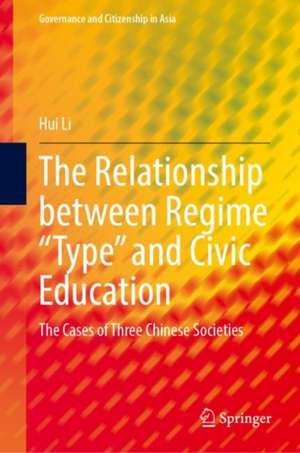The Relationship between Regime “Type” and Civic Education: The Cases of Three Chinese Societies: Governance and Citizenship in Asia
Autor Hui Lien Limba Engleză Hardback – 29 sep 2021
| Toate formatele și edițiile | Preț | Express |
|---|---|---|
| Paperback (1) | 690.29 lei 6-8 săpt. | |
| Springer Nature Singapore – 30 sep 2022 | 690.29 lei 6-8 săpt. | |
| Hardback (1) | 696.35 lei 6-8 săpt. | |
| Springer Nature Singapore – 29 sep 2021 | 696.35 lei 6-8 săpt. |
Preț: 696.35 lei
Preț vechi: 819.23 lei
-15% Nou
Puncte Express: 1045
Preț estimativ în valută:
133.25€ • 139.47$ • 110.90£
133.25€ • 139.47$ • 110.90£
Carte tipărită la comandă
Livrare economică 31 martie-14 aprilie
Preluare comenzi: 021 569.72.76
Specificații
ISBN-13: 9789811652325
ISBN-10: 9811652325
Ilustrații: XV, 144 p. 2 illus.
Dimensiuni: 155 x 235 mm
Greutate: 0.4 kg
Ediția:1st ed. 2021
Editura: Springer Nature Singapore
Colecția Springer
Seria Governance and Citizenship in Asia
Locul publicării:Singapore, Singapore
ISBN-10: 9811652325
Ilustrații: XV, 144 p. 2 illus.
Dimensiuni: 155 x 235 mm
Greutate: 0.4 kg
Ediția:1st ed. 2021
Editura: Springer Nature Singapore
Colecția Springer
Seria Governance and Citizenship in Asia
Locul publicării:Singapore, Singapore
Cuprins
Chapter 1 Introduction.- Chapter 2 Regime “Type” and Civic Education: Theoretical Perspectives.- Chapter 3 Civic Education in an Authoritarian Regime: The Case of Mainland China.- Chapter 4 Civic Education in a Hybrid Regime: The Case of Hong Kong.- Chapter 5 Civic Education in Democracy: The Case of Taiwan.- Chapter 6 Cross-cases Analysis on Regime “Type”, ‘Good Citizen’ and Civic Education.- Chapter 7 Key Factor for Impact of Regime “Type” on Patterns of Civic Education: Regime Capacity.- Chapter 8 Discussion and Conclusion.
Notă biografică
Hui Li is an Assistant Professor at the School of Education at Guangzhou University, China. She holds a Ph.D. from the Education University of Hong Kong, and a Master’s from Beijing Normal University. Her research interests relate to civic learning, civic teaching, and national identity education. Hui Li has participated in various research projects over the past 7 years (relationship between national education and Mandarin subjects, and students’ perception of citizenship in Taiwan, Hong Kong, and Mainland China), including a number of international projects, such as Project of 2017 Chinese Ministry of Education’s Humanities and Social Sciences Research: “A study on the integration of national education into Mandarin subject in Hong Kong”, ERI-Net 2015 Research project on teachers’ education Responses to Globalization and Regionalization.
Below are the journal articles exemplifying her expertise in citizenship education: The changes in Hong Kong students’ perceptions of the “good citizen”: Implications for implementing civic education curriculum (2020), Educational Studies; Chinese students’ perceptions of the ‘good citizen’: Obedience to an authoritarian regime (2018), Citizenship Teaching & Learning; Chinese Teachers’ Perceptions of a ‘Good Citizen’: Personally Responsible Citizen (2017), Journal of Moral Education; Chinese Teachers’ Perceptions of a Good Citizen: Implications for Implementing Civic Education Curriculum (2016), Citizenship Teaching and Learning.
Textul de pe ultima copertă
Using comparative qualitative methodology, this book examines three Chinese societies, Taiwan, Hong Kong, and Mainland China, as specific cases of democratic, hybrid and authoritarian regimes, presenting the theoretical underpinnings of civic education in contexts other than liberal democracy. It highlights on the concept of ‘good citizens’ in these three regime contexts and explores how these concepts are reflected in civic education and perceived by students in the three societies. The book focuses on three levels of comparison to ensure that all relevant issues can be identified: Level 1: regime “type”; Level 2: curriculum and policy formulations; Level 3: students’ personal experiences. These three levels are linked with each other and form a continuous process of civic education implementation in Taiwan, Hong Kong, and Mainland China.
Caracteristici
Focuses on the key problem of how civic education is influenced by regime “type” Clarifies the differences between civic education in Taiwan, Hong Kong, and Mainland China Helps readers to understand the complex relationship between civic education and political system













